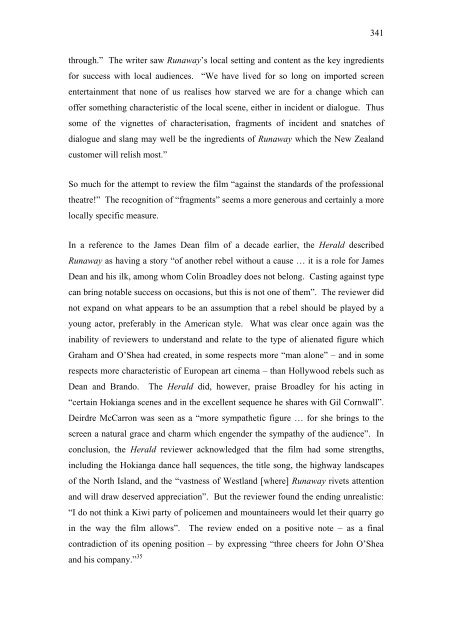Copyright Statement - ResearchSpace@Auckland
Copyright Statement - ResearchSpace@Auckland
Copyright Statement - ResearchSpace@Auckland
Create successful ePaper yourself
Turn your PDF publications into a flip-book with our unique Google optimized e-Paper software.
341<br />
through.” The writer saw Runaway’s local setting and content as the key ingredients<br />
for success with local audiences. “We have lived for so long on imported screen<br />
entertainment that none of us realises how starved we are for a change which can<br />
offer something characteristic of the local scene, either in incident or dialogue. Thus<br />
some of the vignettes of characterisation, fragments of incident and snatches of<br />
dialogue and slang may well be the ingredients of Runaway which the New Zealand<br />
customer will relish most.”<br />
So much for the attempt to review the film “against the standards of the professional<br />
theatre!” The recognition of “fragments” seems a more generous and certainly a more<br />
locally specific measure.<br />
In a reference to the James Dean film of a decade earlier, the Herald described<br />
Runaway as having a story “of another rebel without a cause … it is a role for James<br />
Dean and his ilk, among whom Colin Broadley does not belong. Casting against type<br />
can bring notable success on occasions, but this is not one of them”. The reviewer did<br />
not expand on what appears to be an assumption that a rebel should be played by a<br />
young actor, preferably in the American style. What was clear once again was the<br />
inability of reviewers to understand and relate to the type of alienated figure which<br />
Graham and O’Shea had created, in some respects more “man alone” – and in some<br />
respects more characteristic of European art cinema – than Hollywood rebels such as<br />
Dean and Brando. The Herald did, however, praise Broadley for his acting in<br />
“certain Hokianga scenes and in the excellent sequence he shares with Gil Cornwall”.<br />
Deirdre McCarron was seen as a “more sympathetic figure … for she brings to the<br />
screen a natural grace and charm which engender the sympathy of the audience”. In<br />
conclusion, the Herald reviewer acknowledged that the film had some strengths,<br />
including the Hokianga dance hall sequences, the title song, the highway landscapes<br />
of the North Island, and the “vastness of Westland [where] Runaway rivets attention<br />
and will draw deserved appreciation”. But the reviewer found the ending unrealistic:<br />
“I do not think a Kiwi party of policemen and mountaineers would let their quarry go<br />
in the way the film allows”. The review ended on a positive note – as a final<br />
contradiction of its opening position – by expressing “three cheers for John O’Shea<br />
and his company.” 35















